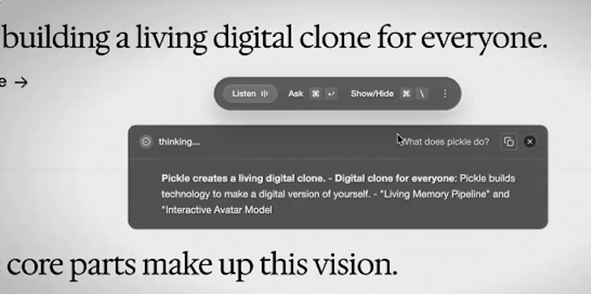In early July 2025, a groundbreaking open-source AI desktop assistant named Glass emerged, capturing the attention of developers and professionals alike. Developed by the innovative Pickle team, Glass offers an unprecedented smart office experience with its stealthy design, real-time information processing, and robust contextual understanding capabilities. This tool can capture screen activities and audio, transforming scattered information into structured knowledge, making it ideal for meeting notes, study aids, and programming support.

Stealthy Design: Balancing Privacy and Efficiency
Glass stands out with its "invisible" feature, operating in the background without appearing in screen recordings, screenshots, or macOS's Dock bar. This ensures user privacy while maintaining a low-profile operation. Unlike traditional AI assistants that require user-initiated interactions, Glass proactively analyzes tasks by observing screen content and audio in real-time, offering instant suggestions or knowledge support. This design not only enhances work efficiency but also prevents disruptions to the user's workflow.
Real-time Meeting Assistant: Intelligent Documentation and Resolutions
Glass demonstrates its practicality in meeting scenarios by listening to audio in real-time, automatically generating meeting records and summaries, and providing context-specific answers. For instance, when a technical term or issue is mentioned during a meeting, Glass can instantly provide relevant background knowledge or solutions, significantly improving meeting efficiency and information organization. Additionally, Glass can structure meeting content into organized notes for easy future reference and sharing.
Multi-scenario Applications: Enhancing Learning and Development
Beyond meeting scenarios, Glass extends its functionality to learning and programming. During study sessions, Glass analyzes documents or web pages being browsed by the user, automatically organizing key information into study notes. In programming scenarios, it observes the code interface to provide real-time debugging suggestions or optimization solutions. Thanks to its open-source nature, developers can customize Glass's features via GitHub to meet their specific needs.
Open Source Community-Driven: Transparency and Scalability
As an open-source project under the Apache2.0 license, Glass has garnered 1.8k stars and 323 forks on GitHub, showcasing a highly active community. Developers can contribute to Glass's continuous improvement by submitting issues, suggestions, or code. The Pickle team has stated that Glass is the first step towards their vision of creating "user-specific digital clones," with plans to expand features and explore more AI-driven innovative applications. It's worth noting that Glass currently supports macOS, with Windows and Linux versions eagerly anticipated by the community.
Glass's release signifies another breakthrough for open-source AI tools in the desktop assistant domain. Its stealthy design and real-time contextual understanding address the pain points of cumbersome interactions with traditional AI assistants while winning developer trust and support through its open-source model. Glass's free and transparent nature gives it a competitive edge over paid tools like Cluely, and its modular design offers endless possibilities for future feature expansion. For users seeking efficient office solutions and personalized customization, Glass is undoubtedly a powerful tool worth exploring.